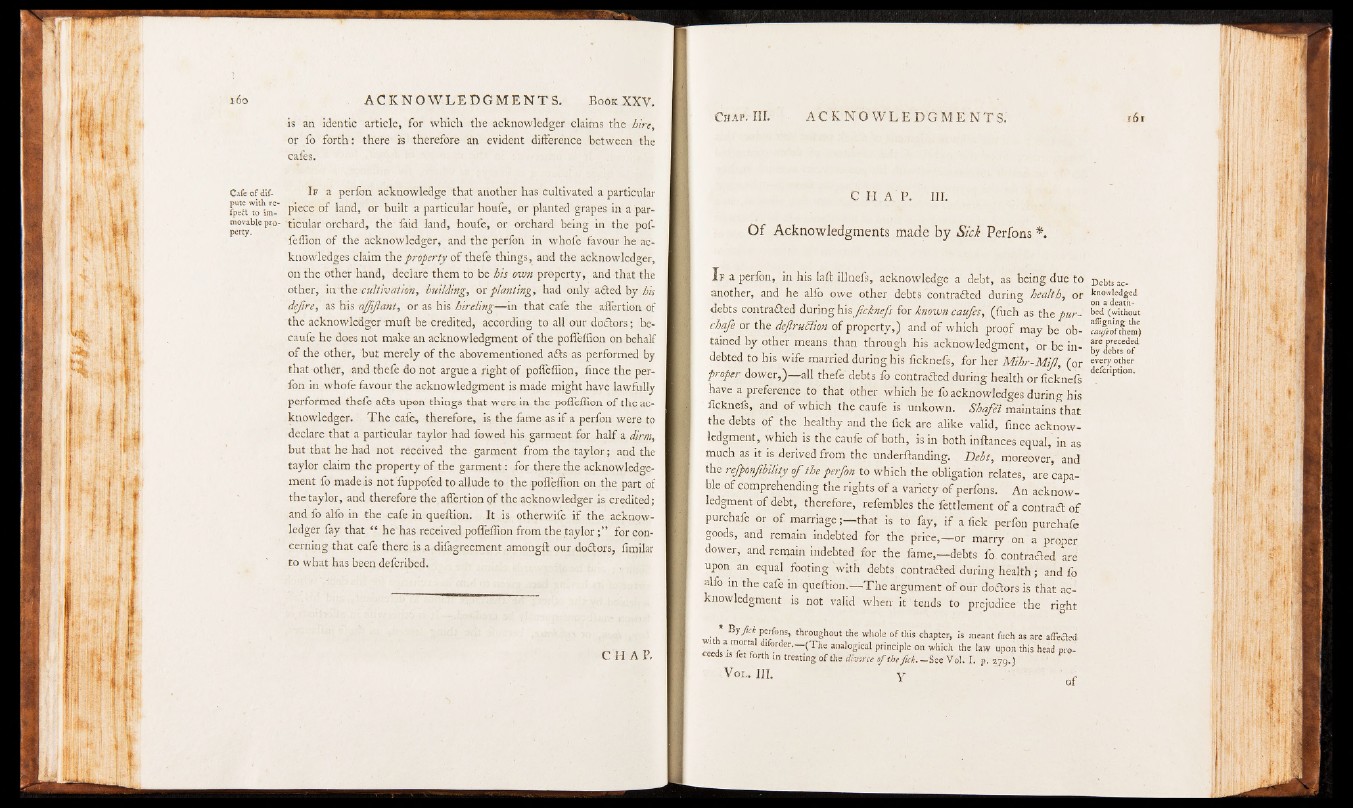
is an identic article, for which the acknowledger claims the hire,
or fo forth: there is therefore an evident difference between the
cafes.
Cafe o f dif-
pute with re-
îpeét to immovable
property.
If a perfon acknowledge that another has cultivated a particular
piece of land, or built a particular houfe, or planted grapes in a particular
orchard, the faid land, houfe, or orchard being in the poffeffion
of the acknowledger, and the perfon in whofe favour he acknowledges
claim the property of thefe things, and the acknowledger,
on the other hand, declare them to be his own property, and that the
other, in the cultivation, building, or planting, had only aded by his
dejire, as his ajjijlant, or as his hireling— in that cafe the aflertion of
the acknowledger muft be credited, according to all our doctors; be-
caufe he does not make an acknowledgment of the poffeffion on behalf
of the other, but merely of the abovementioned ads as performed by
that other, and thefe do not argue a right of poffeffion, lince the perfon
in whofe favour the acknowledgment is made might have lawfully
performed thefe ads upon things that were in the poffeffion of the acknowledger.
The cafe, therefore, is the fame as if a perfon were to
declare that a particular taylor had fowed his garment for half a dirm,
but that he had not received the garment from the taylor; and the
taylor claim the property of the garment : for there the acknowledgement
fo made as not fuppofed to allude to the poffeffion on the part of
the taylor, and therefore the aflertion of the acknowledger is credited;
and fo alfo in the cafe in queftion. It is otherwife if the acknowledger
fay that “ he has received poffeffion from the t a y l o r f o r concerning
that cafe there is a difagreement amongft our dodors, fimilar
to what has been defcribed.
C H A ' P . III.
Of Acknowledgments made by Sick Perfons *.
I f a perfon, in his laft illnefs, acknowledge a debt, as being due to Debts ac-
another, and he alfo owe other debts contracted during health, or knowledged
debts contracted during his fcknefs for known caufes, (finch as the pur- bed (without
chafe or the deftruclion o f property,) and of which proof may be ob- L^ofthem)
tamed by other means than through his acknowledgment, or be in- ffei,r1ecede/
j , , , . . . • -i i i ° 9 by debts o f
debted to his wire married during his ficknefs, for her Mihr-Mijl, for everrY. °ther
proper dower,)— all thefe' debts fo contraded during health or ficknefs dercr!ption-
have a preference to that other which he fo acknowledges durino- his
ficknefs, and of which the caufe is unkown. Shaj'e'i maintains that
the debts of the healthy and the fick are alike valid, fince acknowledgment,
which is the caufe o f both, is in both inftances equal, in as
much as it is derived from the underftanding. Debt, moreover, and
the refponfibility o f the perfon to which the obligation relates, are capable
of comprehending the rights of a variety of perfons. An acknowledgment
of debt, therefore, refembles the fettlement of a contract of
purchafe or of. mar r i agethat is to fay, if a fick perfon purchafe
goods, and remain indebted for the price,— or marry on a proper
dower, and remain indebted for the fame,— debts fo contracted are
upon an equal footing with debts contraded during health; and fo
alfo in the cafe in queftion.— T h e argument of our dodors is that -acknowledgment
is not valid when- it tends to prejudice the right
j uuuuguouc me wnoie or tins chapter, sa iiicaui
with a mortal diforder— (T h e analogical principle on which the law upon this head proceeds
JS fet forth in treating o f the divorce o f ih e fu i . - S e e V o l. I . p . 279.}
Vo:,. III. Y
of